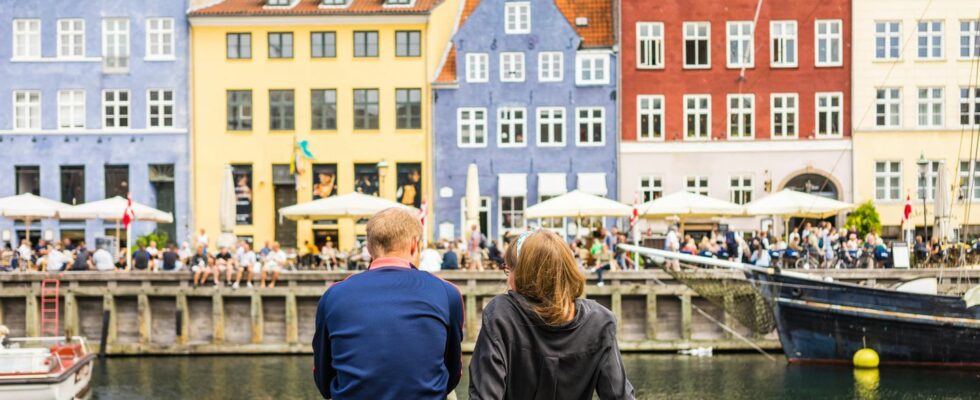Scandinavian lifestyle
3 things I learned from my Danish family about living a contented life
© studiolaska / Adobe Stock
Why are people in Denmark so much happier than Germans? As a half-Danish woman, I know both cultures and always notice differences, especially in mentality. These three particularly contribute to the fact that life in Denmark is more relaxed than here.
The Scandinavian peoples and especially the Danes top the rankings of the happiest countries in the world every year. Denmark could just speak loudly “World Happiness Report” once again landed in second place – only Finland was ahead of it. Incidentally, Sweden and Norway are in seventh and eighth place. Why is that? Why are people in the Nordic countries apparently so much happier and more relaxed than others – especially than us Germans (hello, 24th place!), even though we are doing similarly well in terms of prosperity and security?
As a half-Danish woman, I spent some of my childhood in Denmark and still visit my family there regularly. I always notice how different the mentality is from the German one. And this mentality apparently ensures that the Danes are more balanced and happier than other peoples. So how do they do it?
Insights from a half-Danish woman: Why people in Denmark are so much more relaxed than us
1. Work is just work
The first thing that comes to mind is work, or as we like to say: work-life balance. To be honest, people in Denmark do it a lot better than we do. On average, Danes work less than Germans; (full-time) working hours from 8 a.m. to 4 p.m. are not uncommon. And on Fridays, most people wouldn’t even think of staying in the office or home office longer than midday.
When my mother and I visit the family for a weekend, we are often met with incomprehension when we work the same hours on Fridays as on the other days. My uncle has usually been sitting relaxed at home since lunchtime, waiting for the strange, work-crazy relatives from Germany.
Of course, there are differences in Denmark depending on the industry and profession, but a working week there usually has 35 to 37 hours, while the Germans often have to work 40 hours. We don’t even want to start talking about plans and ideas from various politicians to increase weekly working hours to 42 hours.
And even though we may not be able to change our working hours and especially not as an individual in the system, we can certainly work on our perspective. Many Danes, just like the Germans, like their jobs and enjoy working. But in my experience, work is simply not as much of a focus for them as it is for us. A job is a job, but real life happens before and after. And that definitely makes you happier than defining yourself by your job or often even endangering your own health because we invest too much time and energy in it.
2. Hygge – the real thing
Sure, no article about Denmark can do without hygge. But my concern here is with the actual meaning of this word. It doesn’t have as much to do with the cozy furnishing style, cozy pillows and hot chocolate as advertising would have us believe. Hygge is more about quality time, especially about being together in a cozy atmosphere with others. And yes: We can spend this quality time on the couch with a good book in dimmed light, sometimes perhaps alone, but more likely with our best friend or family. But: A nice evening in our favorite pub or at a festival can be just as hygge.
It’s about coziness, but I’ve almost always only heard the word in a social context. The Danes attach great importance to spending a good time with the people they love. In general, I never really encountered the term hygge as a noun, but rather as a verb or adjective. The focus is on consciously making ourselves comfortable, preferably with others – and not on forcing the whole thing into our lives as an artificial concept by filling our apartment with wool blankets and scented candles. Anyone who values truly hygge moments will definitely be happier in the long term.
3. More trust, please!
A big difference that I always notice between my family in Denmark and my environment here in Germany is literally open doors. When my mother and I visit the family (after we finally get off work late on a Friday afternoon…), it’s completely natural that we just come into the house. I can’t remember ever seeing front doors locked or the doorbell ringing.
Now I have to say that my family lives in a very small town. In Copenhagen or Aarhus, not everyone will leave their apartment doors unlocked. But still, this small example says a lot about the Danish mentality and the trust it places in other people. In comparison, in the small German town where I grew up, I never experienced people simply coming into the house through the unlocked door.
Of course, in Denmark too, the trust that many people give to their fellow human beings is sometimes abused. But overall it just puts you in a much better mood and makes people a lot more relaxed when they don’t always assume the worst.
As trite as it may sound: if we manage to see life and interactions a little more relaxed, we automatically become more relaxed – and therefore more satisfied. And maybe it will work out with a higher ranking than the current 14th place in the World Happiness Report.

